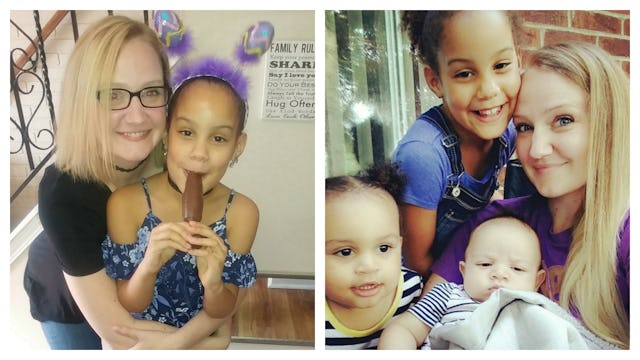Why It Hurts So Much When People Assume I'm Not My Daughter's Mom

I will never forget the first time someone questioned my relation to my daughter. With her beautiful tight brown curls, deep brown eyes and her smooth, dark complexion, I can vaguely understand how one might contrast her to my pin straight blonde hair, light blue eyes and pale white skin, and think I am the babysitter instead of the woman who had birthed, nurtured, and cared for her since conception.
The first time my role as mother to my gorgeous biracial daughter was brought up as a topic of conversation was surprisingly the easiest. I had signed up to volunteer for the morning in my daughter’s kindergarten class. Once I was introduced and assigned my position at the glue table, an adorable freckled little boy sat across from me and silently stared.
I asked him if there was anything I could help him with. Thinking he would ask me to adhere a petal to the flower we were constructing, I was shocked when instead he said, “You’re not really Ryleigh’s mom, are you?”
I told him yes, I am, and turned my attention to the little girl in pigtails two seats down, who had apparently tried gluing her finger to her forehead, and now had glue dripping down into her eye.
However, Freckles wasn’t done with his questioning. He tapped me on my arm and further inquired, “But how are you her mom when she has brown skin, and yours is white like mine?”
I was shocked. This was my first time volunteering, and I had already allowed the sure visual impairment of Miss Pigtails and was now being questioned about DNA and genetics?
I took in a deep breath and explained that while I have white skin, Ryleigh’s father has dark skin, so she ended up being the perfect mix of both of her parents. Freckles looked at me, a little puzzled, and then said, “Oh, do you have a favorite superhero?” And our conversation veered to the superiority of the Hulk over Spider Man. He easily accepted my answer and moved on with his life.
The next time I was assumed to be a nanny, instead of the mother, was a little harder for me to come to terms with. My partner and I had brought our three children to the city library so that I could do some research while they played in the kids’ section. After finishing up with my work, I joined my family and sat down with my son to play with blocks. The elderly librarian watched the entire time.
Before packing up, I brought my daughter up to the desk to help her sign up for her own library card. After asking for the form, the librarian looked back and forth between my 8-year-old and me, and said, “Ma’am, this little girl will need her parent or legal guardian here to sign the form. Is that her father over there? Please send him over and he can fill out the paperwork.”
I felt like I had been hit in the stomach. I carried this child in my body for 9 months, gave birth, woke up with her every single night, read to her, sang to her, bathed her. She was my life. And this woman with her glaring eyes had dismissed even the possibility that I could have mothered her just by looking at us.
I once again took in a deep breath, and replied that there would be no reason to call her father over, that as her mother I was more than capable of filling out the form. The librarian looked at me, baffled, stumbling over her words with apologies that she had “just figured…” and “your daughter is just so much darker…” before she finally shut up and passed me the paperwork.
These two encounters have been etched into my mind ever since. In a predominantly white neighborhood, it was not so hard for me to accept that a five-year-old had never been exposed to a multi-racial family before. It was fairly easy to laugh off his questioning, and move on. But it was much more difficult for me to shrug off the inner-city elderly librarian who used her assumptions and then ignorance in trying to defend herself by openly mentioning my daughter’s skin color as a reason for our apparent non-relation.
Families are made up in so many different ways now. It is well past time we accept the beauty of the uniqueness of our home-bases. From single-parent households to ones with same-sex parents to multi-racial ones, we all deserve the same respect and acceptance in society. After all, each of us is just trying to do the best for our children.
This article was originally published on